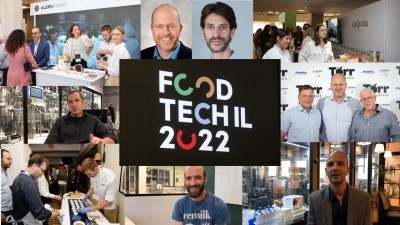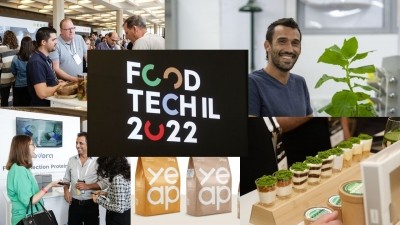Mediterranean Food Lab: A flavor revolution with solid state fermentation
Led by award-winning film director, researcher and culinary entrepreneur B.Z. Goldberg, Mediterranean Food Lab deploys art and science through a traditional solid state fermentation technology combined with an AI-driven computational platform to create clean label savory ingredients that give depth, body, and meaty flavors to everything from bean-based dishes to meat-analogs.
MFL first uses microbes to eat away at a substrate such as grains or legumes or waste streams from the milling, baking, cooking oil or vegetable processing industries, and then uses the enzymes that are produced to serve as biocatalysts in a second fermentation stage, creating ingredients that would be listed as, for example, ‘fermented barley’ or ‘fermented chickpea’ rather than as ‘natural flavors.’
“Analysts debate the size of the meat-alternatives market, but if you look at what I call alternatives to meat [which doesn’t necessarily mean meat analogs, he points out], that’s an immense opportunity,” said Goldberg, who noted that solid state fermentation has been around for hundreds of years, but said MFL turns it from a black box to something more controlled.
“It's basically a way to transform large tasteless molecules into something incredibly flavorsome, turning carbohydrates into sugars, and proteins into amino acids and so on. So, basically, in the beginning, it was what I'd call 'directed and educated trial and error,' as we had good ideas about what kind of microorganisms and substrates we wanted to use.
"But as we got more and more information, we began to learn which processes might give us the molecules we wanted and what substrates we needed to use that have the precursors for those molecules."
After a while, with more and more data points, MFL has deployed machine learning to understand what to put in, in order to get something very specific out of the end of the fermentation process, understanding, for example, “the relationships between the genomics of a particular microbial strain and what you can do with a particular substrate to create a targeted flavor,” he said.
Ultimately, the potential of the platform is pretty broad, he said, but the initial focus will be on two markets: meat alternatives [eg. beef, chicken analogs etc], and alternatives to meat [which may or may not involve analogs], which are not necessarily the same thing, he argued.
And in both cases, MFL is not simply looking to precisely mimic the flavor of meat, he stressed.
“People don’t necessarily want the exact flavor of meat, they want the experience, something satisfying and rich and complex. They want long-lasting pleasure and satisfaction that can last for hours, whereas the current flavor solutions on the market have a 30 or 60-second contract with the end consumer.”
He added: “We’re in the process of signing joint development agreements with a number of different companies and we’re scaling up and finding production partners."

































